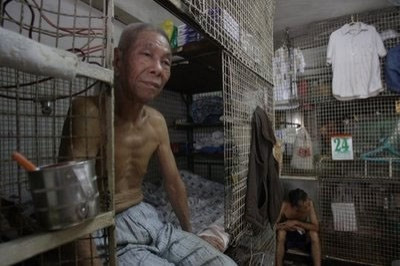Rich Man, Poor Man: The Widening Wealth Gap in Hong Kong

The gap between the rich and the poor is widening in many countries – but perhaps nowhere more so than in Hong Kong.
On the one hand, the island’s economy is humming along, with handsome annual GDP (estimated to grow by four percent to five percent in 2011) and low unemployment (3.4 percent in the first quarter of this year).
However, on the flip-side, high inflation and soaring real estate prices have thrown thousands of residents into dire straits.
In May, the government hiked its estimate for the inflation rate to 5.4 percent for this year, up from a prior forecast of 4.5 percent.
Not surprisingly, incomes have failed to match the pace of inflation, Reportedly, real wages for Hong Kong residents are lower than they were a decade ago.
Of the island nation’s seven million residents, about 1.2 million are living on subsidies – and more than half the population reside in public housing.
Meanwhile, according to Forbes magazine, in Jan. 2011, the combined wealth of the 40 wealthiest individuals in Hong Kong soared by 20 percent to $163 billion in just one year.
Moreover, since the Hong Kong dollar is pegged to the ever-weakening U.S. greenback, inflationary pressures have worsened, especially with respect to food and fuel, both of which must be imported.
Adrian Mowat, JPMorgan Chase’s chief Asia and emerging-market strategist, recently told Bloomberg Television: “Hong Kong has a fixed exchange rate; at the top of a cycle, inflationary pressures build dramatically, Hong Kong becomes less competitive. And so we’d expect Hong Kong’s growth to slow next year. We’re very bearish on Hong Kong property, which quite frankly, is unaffordable for the bulk of the population.”
Part of the problem lies with Hong Kong’s intimate economic and political relations with its giant neighbor, China.
Largely due to mainland Chinese with very deep pockets who are snapping up luxury properties in Hong Kong (in tandem with record low interest rates and a shortage of land on the small island), home prices are climbing an astounding two percent every month, according to the country’s leader, chief executive Donald Tsang.
Since the start of 2009, housing prices have surged 70 percent.
In the first quarter of 2011, almost 40 percent of all luxury property buyers in Hong Kong were from mainland China, according to Centaline Property Agency Ltd.
“What is fueling, one might say overheating, Hong Kong's economy is hot money from the mainland,” said Gary C. Biddle, chair professor at the University of Hong Kong, to IB Times.
“It is, in effect, money laundering on a massive scale – with flats and luxury goods in particular.”
Just last month, a home on The Peak (an exclusive part of Hong Kong) sold for (Hong Kong)$800 million -- or about $103 million (in U.S. dollars), a record.
“There’s a critical shortage of land supply over this period,” Tsang has said.
“At the same time, there’s heavy demand from investors both in Hong Kong and from abroad, and particularly of mainland China.”
In response, Tsang has taken some measures to put the brakes on the runaway speculative property market, including an increase in minimum down payments and deposits for mortgage borrowers; as well as enacting higher transaction taxes. Tsang’s administration also plans to construct more than 20,000 homes to alleviate the housing shortage.
Now, there are fears Hong Kong inexorably risks sharing China's housing bubble, which some suggest is bigger than the one that has wrecked the U.S. economy.
Meanwhile, Tsang’s popularity keeps sinking… and protests against his rule have accelerated.
“People think Donald Tsang favors the interests of big business, and this is the reason behind his apparent refusal to resolve the housing issue or narrow the wealth gap,” said Joseph Cheng, a political science professor at City University of Hong Kong, according to media reports.
“Dissatisfaction against the government is certainly rising, and we will probably see more protests.”
Perhaps to stave off even more social unrest, Tsang’s regime has offered a carrot stick of sorts – they have introduced a minimum wage and they are even offering a cash payment of (Hong Kong)$6,000 to each permanent resident of Hong Kong in November.
Biddle is less than impressed by the gesture of largesse.
“[It’s] a knee-jerk reaction to criticism of the government's huge surplus and the original plan to donate the money to The Mandatory Provident Fund (MPF) retirement scheme,” he said.
MPF is a compulsory pension fund for the retirement of Hong Kong residents.
Biddle notes that under the provisions of the MPF retirement scheme, huge management fees would have been disbursed to the investment bankers running it.
“Now it's a mess,” he said. “Then, there is the question of whether it makes sense to inject cash, to be used largely for consumption, into an already overheated economy.”
Of course, Hong Kong is not the only country in Asia where the poor are increasingly agitated by the growing wealth of the elite. Singapore and China have similar social problems. How they resolve this crisis remains to be seen.
© Copyright IBTimes 2024. All rights reserved.




















